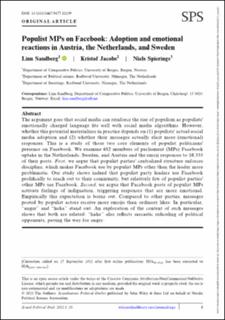| dc.contributor.author | Sandberg, Linn | |
| dc.contributor.author | Jacobs, Kristof | |
| dc.contributor.author | Spierings, Niels | |
| dc.date.accessioned | 2022-11-21T12:22:55Z | |
| dc.date.available | 2022-11-21T12:22:55Z | |
| dc.date.created | 2022-11-09T10:40:47Z | |
| dc.date.issued | 2022 | |
| dc.identifier.issn | 0080-6757 | |
| dc.identifier.uri | https://hdl.handle.net/11250/3033141 | |
| dc.description.abstract | The argument goes that social media can reinforce the rise of populism as populists' emotionally charged language fits well with social media algorithms. However, whether this potential materializes in practice depends on (1) populists' actual social media adoption and (2) whether their messages actually elicit more (emotional) responses. This is a study of those two core elements of populist politicians' presence on Facebook. We examine 682 members of parliament (MPs) Facebook uptake in the Netherlands, Sweden, and Austria and the emoji responses to 10,355 of their posts. First, we argue that populist parties' centralized structure enforces discipline, which makes Facebook use by populist MPs other than the leader more problematic. Our study shows indeed that populist party leaders use Facebook prolifically to reach out to their community, but relatively few of populist parties' other MPs use Facebook. Second, we argue that Facebook posts of populist MPs activate feelings of indignation, triggering responses that are more emotional. Empirically this expectation is borne out. Compared to other parties, messages posted by populist actors receive more emojis than ordinary likes. In particular, “anger” and “haha” stand out. An exploration of the content of such messages shows that both are related: “haha” also reflects sarcastic ridiculing of political opponents, paving the way for anger. | en_US |
| dc.language.iso | eng | en_US |
| dc.publisher | Wiley | en_US |
| dc.rights | Attribution-NonCommercial-NoDerivatives 4.0 Internasjonal | * |
| dc.rights.uri | http://creativecommons.org/licenses/by-nc-nd/4.0/deed.no | * |
| dc.title | Populist MPs on Facebook: Adoption and emotional reactions in Austria, the Netherlands, and Sweden | en_US |
| dc.type | Journal article | en_US |
| dc.type | Peer reviewed | en_US |
| dc.description.version | publishedVersion | en_US |
| dc.rights.holder | Copyright 2022 The Author(s) | en_US |
| cristin.ispublished | true | |
| cristin.fulltext | original | |
| cristin.qualitycode | 1 | |
| dc.identifier.doi | https://doi.org/10.1111/1467-9477.12239 | |
| dc.identifier.cristin | 2071062 | |
| dc.source.journal | Scandinavian Political Studies | en_US |
| dc.source.pagenumber | 504-528 | en_US |
| dc.identifier.citation | Scandinavian Political Studies. 2022, 45 (4), 504-528. | en_US |
| dc.source.volume | 45 | en_US |
| dc.source.issue | 4 | en_US |

